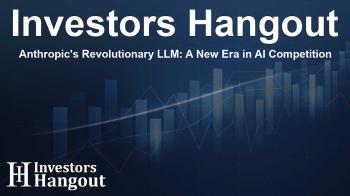Anthropic's Revolutionary LLM: A New Era in AI Competition

Anthropic's Latest AI Release: An Overview
The landscape of artificial intelligence is increasingly competitive, with numerous companies striving to lead the charge in technology innovation. One of the key players, Anthropic, has recently unveiled its advanced language model, Claude 3.7 Sonnet. This model is being hailed as the most intelligent iteration to date, significantly raising the bar in AI development.
A Breakthrough in AI Technology
Backed by influential figures such as Jeff Bezos, Anthropic's Claude 3.7 Sonnet was publicly announced on the company’s official site. The San Francisco-based AI firm is passionate about enhancing its models, and this latest version promises striking improvements.
Enhanced Performance for Developers
One of the standout features of this new model is its improved proficiency in coding and front-end web development tasks. Developers, in particular, may find this model beneficial due to its specialized functions aimed at facilitating better programming experiences.
Extended Thinking Mode: A New Dimension
In addition to enhanced coding capabilities, Claude 3.7 Sonnet introduces an “extended thinking mode.” This mode allows for deeper processing, producing more thoughtful responses, albeit with slightly longer wait times for output. This could greatly assist users in non-urgent tasks where thorough analysis is valued.
Shifting Focus in Model Capabilities
Another interesting aspect of Anthropic's announcement is its shift in focus. Instead of concentrating heavily on theoretical math and computer science problems, the company has redirected its efforts toward developing models that solve real-world challenges. This is a significant move, reflecting how businesses truly utilize language models across various sectors.
Comparative Analysis of Leading AI Models
When delving into the competitive landscape, it is vital to evaluate how Anthropic's new model measures up against its primary competitors, OpenAI and DeepSeek. Both entities offer remarkably capable AI models, and a side-by-side comparison sheds light on each model's strengths and weaknesses.
Performance Rankings
Anthropic has conducted rigorous benchmark tests to evaluate its Claude 3.7 Sonnet against OpenAI's offerings, including the o1 and o3-mini models, as well as DeepSeek's R1 model. The results have shown that Claude 3.7 Sonnet excels in several areas.
Strength in Coding and Reasoning
The transfer of technologies and increased application of AI in industry have led to a competitive edge for Claude 3.7 Sonnet. The model significantly outperforms its peers, particularly in coding tasks and interactions with external systems, showcasing its versatility and robustness.
Real-World Applications and Future Prospects
As AI continues to evolve, the importance of practical applications cannot be overstated. Tools like Claude 3.7 Sonnet are expected to play a considerable role in shaping how businesses operate and process information. Organizations that leverage such advanced models can enhance their operational efficiencies and drive innovation.
Conclusion: The AI Revolution Continues
The introduction of Anthropic's Claude 3.7 Sonnet marks a pivotal moment in the AI landscape, redefining what users can expect from a language model. With its improved coding capabilities, innovative thinking modes, and practicality for real-world applications, Anthropic is poised to make substantial impacts on the industry.
Frequently Asked Questions
What is Claude 3.7 Sonnet?
Claude 3.7 Sonnet is Anthropic's latest AI language model, known for its advanced capabilities and improved performance in coding and reasoning tasks.
How does Claude 3.7 compare to OpenAI and DeepSeek models?
In benchmark tests, Claude 3.7 Sonnet has shown superior performance in various categories, particularly in coding and external system interactions.
What is the significance of the extended thinking mode?
The extended thinking mode allows Claude 3.7 Sonnet to produce more thoughtful responses by taking extra time to process prompts, benefiting complex tasks.
Why is shifting focus to real-world tasks important?
This shift recognizes the practical applications of AI in business settings, aiming to create models that assist users in day-to-day operations rather than just theoretical exercises.
What impact does Anthropic aim for with its new model?
By improving capabilities and focusing on real-world applications, Anthropic aims to enhance business efficiencies and foster innovation across industries.
About The Author
Contact Riley Hayes privately here. Or send an email with ATTN: Riley Hayes as the subject to contact@investorshangout.com.
About Investors Hangout
Investors Hangout is a leading online stock forum for financial discussion and learning, offering a wide range of free tools and resources. It draws in traders of all levels, who exchange market knowledge, investigate trading tactics, and keep an eye on industry developments in real time. Featuring financial articles, stock message boards, quotes, charts, company profiles, and live news updates. Through cooperative learning and a wealth of informational resources, it helps users from novices creating their first portfolios to experts honing their techniques. Join Investors Hangout today: https://investorshangout.com/
The content of this article is based on factual, publicly available information and does not represent legal, financial, or investment advice. Investors Hangout does not offer financial advice, and the author is not a licensed financial advisor. Consult a qualified advisor before making any financial or investment decisions based on this article. This article should not be considered advice to purchase, sell, or hold any securities or other investments. If any of the material provided here is inaccurate, please contact us for corrections.

